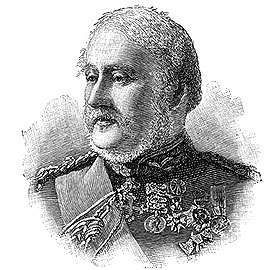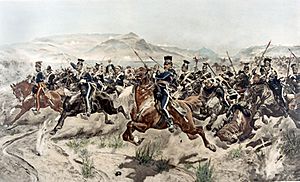Lord William Paulet facts for kids
Quick facts for kids
Lord William Paulet
|
|
|---|---|

Lord William Paulet
|
|
| Born | 7 July 1804 Andover, Hampshire |
| Died | 9 May 1893 (aged 88) St. James's Square, London |
| Allegiance | |
| Service/ |
|
| Years of service | 1821–1870 |
| Rank | Field Marshal |
| Commands held | 1st Brigade at Aldershot South-West District |
| Battles/wars | Crimean War |
| Awards | Knight Grand Cross of the Order of the Bath |
Lord William Paulet (born July 7, 1804 – died May 9, 1893) was a very important officer in the British Army. He became a Field Marshal, which is the highest rank in the army.
Lord William Paulet is best known for his role in the Crimean War. He helped lead the cavalry (soldiers on horseback) in famous battles. These included the Battle of Alma, the Battle of Balaklava, and the Battle of Inkerman. He also took part in the long Siege of Sevastopol. After the war, he held several important leadership jobs in the army.
Contents
Early Life and Army Start
Lord William Paulet was born in Andover, Hampshire. He was the fourth son of Charles Paulet, 13th Marquess of Winchester. He went to school at Eton College.
In 1821, when he was 16, he joined the army. He became an officer in the 85th Light Infantry. Over the next few years, he moved to different regiments. He became a captain in 1825 and a major in 1830.
In 1843, he became the commanding officer of the 68th Light Infantry. This was a big responsibility. A few years later, in 1851, he became an equerry. This meant he worked closely with the Duke of Cambridge.
Fighting in the Crimean War
The Crimean War was a major conflict from 1853 to 1856. Lord William Paulet played a key role in it. He was the Assistant Adjutant-General for the Cavalry Division. This meant he helped manage and organize the cavalry troops.
He fought in several important battles:
- Battle of Alma (September 1854): This was one of the first major battles of the war.
- Battle of Balaklava (October 1854): This battle is famous for the "Charge of the Light Brigade." During this battle, a bullet actually shot off Lord Paulet's hat!
- Battle of Inkerman (November 1854): Another fierce battle where he showed bravery.
- Siege of Sevastopol (1854–1855): This was a long siege of a Russian city.
After these battles, Lord Paulet was put in charge of the army's rear areas. This included important places like the Bosphorus, Gallipoli, and the Dardanelles. He also supported Florence Nightingale in her efforts to improve medical care for soldiers. He was promoted several times during the war for his service.
Later Army Leadership Roles
After the Crimean War, Lord William Paulet continued to rise in the army.
- In 1856, he became the Commander of the 1st Brigade at Aldershot.
- In 1860, he was put in charge of the South-West District. This area had its headquarters in Portsmouth.
- In 1865, he became the Adjutant-General to the Forces. This was a very important job. He was responsible for the army's administration and organization.
In 1866, he joined a special group called a Royal Commission. They looked at how the British Army recruited new soldiers. He was promoted to lieutenant general in 1867. He retired from his Adjutant-General role in 1870. However, he still received promotions, becoming a full general in 1874 and finally a Field Marshal in 1886.
Lord William Paulet also held honorary positions as a colonel for different regiments. He died in London in 1893 at the age of 88. He never married or had children.
Awards and Honours
Lord William Paulet received many awards for his long and distinguished service:
- Knight Grand Cross of the Order of the Bath (GCB): This is a very high honour from the United Kingdom.
- Legion of Honour: An award from France.
- Order of the Medjidie: An award from the Ottoman Empire (now Turkey).
- Order of Saints Maurice and Lazarus: An award from Sardinia (an Italian state at the time).
 | George Robert Carruthers |
 | Patricia Bath |
 | Jan Ernst Matzeliger |
 | Alexander Miles |


